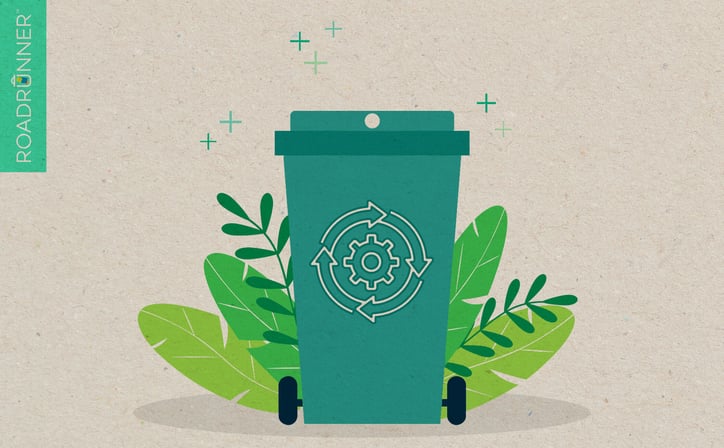Doing a better job with waste management makes good business sense. Recycling is a critical part of our world as waste has become a global problem. Businesses can meet sustainability goals, fight climate change, improve ESG scores, and meet the desires of younger generations by having a better handle on their waste streams.
Better managing waste can help protect the environment and save your business money.
Here are five ways it’s possible.
1. Less weight, fewer pickups
Many waste haulers tie the price a business pays for pickup services to the weight that has to be taken away. If things like cardboard, paper, metal, plastic, and food waste are removed from the trash bin, there’s less that needs to be hauled away to the landfill. Less weight can mean a business pays less.
Additionally, once your business removes those things from the trash, you might find you don’t need pickups as frequently. Trash bins won’t fill as fast. Fewer pickups equal cost savings. On the environmental side, less trash being hauled away means fewer fossil fuels being burned in waste trucks and less waste being dumped into landfills.
>>READ MORE: Food waste transformed into a controversial new fuel
![]()
2. tipping fees
Another thing that can impact the price of waste service for a business is tipping fees. This is a charge that must be paid by anyone wishing to dump trash at a landfill. This is also typically tied to the weight of the load and charged by the ton. In 2020, the nationwide average was just under $54 per ton and the highest fee that year was more than $72 per ton. That price can add up quickly.
There’s been an increase in tipping fees throughout 2022 as companies work to offset the cost of fuel. That cost gets passed onto waste companies dumping at the landfill and the waste companies then pass it on to customers. Fewer trips to the landfill ultimately equal cost savings for your business.
![]()
3. looks good to investors, improves esg score
Putting in place an easy-to-use, functional recycling program at your business is something that many stakeholders want to see, especially younger generations of investors and consumers. Appealing to Millennials, who feel a greater sense of responsibility in fighting climate change overall, can yield big bucks for your company. The generation is quickly becoming the largest consumer group with the most financial capacity.
On top of that, a well-thought-out recycling plan increases a company’s ESG score. ESG, which stands for Environmental, Social, Governance, is in part a measure of how well a business can mitigate risk related to the climate. A high score tells potential investors that your business is on the right track for sustainability. That is something that can also help attract more investors.
READ MORE: Green goals behind ESG investing
![]()
4. avoid fines
Regulations and rules surrounding commercial waste management are constantly changing. In some parts of the U.S., recycling and composting are required by law; in other areas, there are landfill bans. Recycling electronics avoids fines at many landfill sites that won’t take the equipment. Properly disposing of hazardous waste protects your business from fines and the health and safety of other people.
Implementing a recycling program for your business means you’re working to avoid any potential regulatory or legal problems with your waste streams. It also sets your company up to thrive through any possible changes to waste management laws at the local, regional, or state level.
![]()
5. Your business can make money
Believe it or not, your business can start getting money back for recycling items in large enough quantities. If you have enough bales of cardboard, you could be getting paid to recycle it instead of shipping it off the landfill. In Maryland, for example, businesses can get paid the market rate for recyclables. Other states, like New York, offer rebates on things like aluminum cans and plastic bottles. Companies will buy and recycle used cooking oil from restaurants, too. Then there’s scrap metal. It’s probably the most valuable thing a business can recycle. Prices for things like copper, brass, iron, and steel fluctuate. Your business could end up with a nice payday depending on when you get rid of materials.
Recycling for your business doesn’t have to be about spending a dollar to save a dollar. You can get reimbursed for your recyclables. Creating a program that works for your operation might take some outside-the-box thinking depending on your location.
Doing better with your waste doesn’t have to be a headache for your business. For example, putting a recycling program in place can be easy. That program can yield some major dividends for the company. On top of that, every box, bottle, and piece of paper recycled is one less that will be sent to rot away in a landfill. Recycling makes sense for any business out there. It can save money, and it’s a step on the road to meeting sustainability goals.
When you work with RoadRunner, we help create custom solutions that work for your enterprise. We also use our FleetHaul program which utilizes contracted haulers in trucks that get better fuel mileage, pump less greenhouse gas into the air, and save your business money.
Let the power of RoadRunner's green technology go to work for you!
